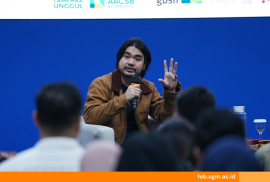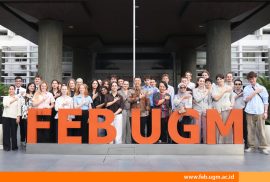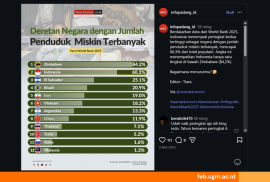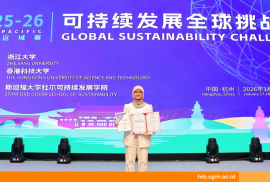Sustainability in higher education, including business schools, is an increasingly important focus. Professor Nurul Indarti, Sivilokonom., Cand.Merc., Ph.D., a distinguished faculty member of the Department of Management, Faculty of Economics and Business at Universitas Gadjah Mada (FEB UGM), highlighted the critical role of sustainability in business education. A key reason is the growing complexity of the challenges facing business leaders and managers today, including environmental degradation, climate change, resource scarcity, and social inequality.
“These challenges require new approaches and innovative solutions,” she said during the Friday FEB UGM Research Day 2024 event (12/13/2024).
In her presentation, titled “Higher Education’s Role in Advancing Sustainability: Embedding It in the Curriculum,” Prof. Nurul highlighted the importance of sustainability in business education. The business world rapidly evolves due to regulatory changes, stakeholder pressure, and shifting consumer expectations toward sustainability.
“The future of business lies in responsibility and resilience. Business schools have a critical role to play in preparing their students to lead with sustainability in mind,” she added.
Prof. Nurul outlined several key roles for business schools. These include raising awareness by encouraging students to understand global issues such as climate change and social inequality, fostering innovation by cultivating a culture that prioritizes sustainability and influencing policy through research and collaboration.
So, how can business schools contribute to sustainable business education? Prof. Nurul explained that business schools can demonstrate their commitment through research activities, educational programs, management and governance practices, and leadership initiatives.
This initiative aligns with FEB UGM’s vision to focus its mission on developing future leaders equipped to address global challenges with integrity and sustainability.
As a concrete step, FEB UGM has introduced a new concentration within its Master of Management (MM) program: Sustainability Management. This new concentration allows students to deepen their knowledge of sustainable management practices. It also supports FEB UGM’s mission to become a leading faculty that develops future leaders capable of addressing global challenges and contributing to sustainability.
Reporter: Shofi Hawa Anjani
Editor: Kurnia Ekaptiningrum
Sustainable Development Goals












